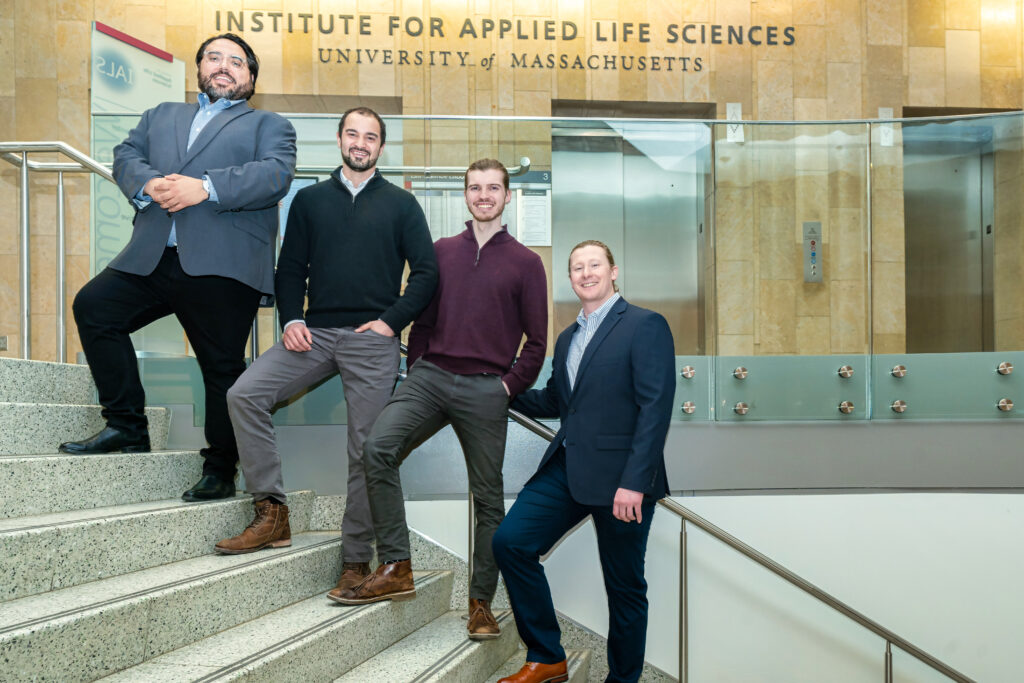As a child, Jose LaSalle dreamed of becoming an inventor. When his family hit hard financial times and lost access to gas, his entrepreneurial spirit found its mission: advancing “ecologically harmonious” energy while supporting a just energy transition.
LaSalle went on to study electrical engineering and materials science at the University of Massachusetts Amherst. His lived experiences and familial history continued to shape both his worldview and the work he hoped to do: coming from an Afro-Indigenous family, some of his relatives with ancestors who were enslaved maintain farms to this day—a trajectory that he says showed him how “regenerative agriculture can seed economic development.”
LaSalle channeled his aspirations, values, and expertise into co-founding florrent, a startup making ultracapacitors with hemp grown by Black and Indigenous farmers.
Ultracapacitors complement batteries in the grid-scale use of renewable energy. Their specialty is in quickly releasing energy for spikes in power consumption, such as for electric-vehicle charging. florrent utilizes a running metaphor to explain the relative strengths of these two technologies: if batteries are marathon runners, then ultracapacitors are sprinters.
Ultracapacitors require activated carbon, which today is provided by either coconut husks or coal. Coal clearly has its environmental problems, but there are drawbacks to coconut husks as well: coconut palm trees are quite susceptible to climate change, and as they cannot be grown locally in many places, there are notable shipping-related emissions.
Hemp sequesters higher levels of carbon, and provides a higher-performance activated carbon for ultracapacitors—meaning a lower price per unit of energy. Crucially for florrent, hemp farming is common in the United States and is often grown by Indigenous and Black farmers. By supporting these local growers, LaSalle says florrent’s tech is both sequestering carbon in hemp and “sequestering wealth” in the farmers’ communities.
If its tech is deployed at scale, florrent says it can enable the abatement of 1.5 gigatons of carbon by 2050 (through supporting the use of renewables) and can sequester 2.2 megatons of carbon in the same period. The startup’s visionary customers include grid asset developers, EV charging infrastructure providers, and ultracapacitor manufacturers.
LaSalle’s co-founders are two people who shared his deeply held values: Joe Hastry, LaSalle’s childhood friend, and Alex Nichols, his college roommate. Hastry brings significant financial experience from seven years at PwC, while Nichols heads up engineering with a deep hardware background built over the last decade at companies in Boston including Elemental Machines.
“I’ve heard that to build a company, you need to really care about the vision, product, and cash flow,” says LaSalle, the company’s CEO. “I’m fortunate with this founding team: the vision is one that we’re co-creating but one that really came from my experiences, Joe is phenomenal with finances, and Alex is an amazing engineer.”
Building out beyond the founding team, florrent’s first hire was its Chief Commercial Officer, Nathaniel Doyno. Nathaniel’s background in venture-backed climatetech, impact investing, and electric utilities adds immense value in contributing to the company’s commercial and fundraising strategy.

The startup is currently raising its pre-seed funding, and expects the round to be oversubscribed. florrent met its largest investor, MassVentures, via Greentown’s Deal Flow Digest—an initiative of the incubator’s Investor Program designed to connect fundraising startups with relevant investors.
“Investors are believing in what we’re doing, believing in the team, and seeing the value,” LaSalle says. “Greentown’s been incredibly supportive. The Investor Program and [its senior manager] Jackie Firsty have led to so many investor conversations, some of which are already lined up for when we’re ready to raise our seed. MassVentures is a great example: they’re our biggest investor, and that connection was through Greentown Labs.”
“We’re really pleased with the progress florrent has made over the past year,” says Priya Yadav, VP Investments at MassVentures. “They’ve got a strong team; they listen well; and their technology is making the right advances. florrent hits our investment sweet spot and we are grateful to Greentown Labs for bringing the startup to our attention.”
The four-person team plans to hire three roles in the next few months, and over the next year aims to deliver its cylindrical cells to customers for techno-economic validation and commercial off-take.
A major focus area for LaSalle is building an inclusive, fun, and values-driven team as the company grows. In fact, this goal is one of the reasons he applied to join the inaugural cohort of ACCEL—an accelerator from Greentown and Browning the Green Space (BGS) designed to support BIPOC-led startups by offering access to funding, networking connections, resources, and opportunities that structural inequities put out of reach. The program combines acceleration with a curated curriculum, incubation through Greentown membership, and extensive mentorship from Greentown and BGS’s networks of industry experts.
“I’ve never been at a diverse company before, and I want to learn how to build a healthy, inclusive, excellent, thriving, fun, and diverse company,” he says. “What does it mean to build that culture from the ground up? I felt I could get a lot of guidance in navigating that from this program.”
ACCEL is in its early weeks, but LaSalle shares that he’s excited to work with the accelerator’s expert mentors.
“On the business development side, ACCEL has curated a phenomenal list of mentors that have probably gone through virtually every challenge I’m going through and can speak to them. That was another big attraction to this program.”

